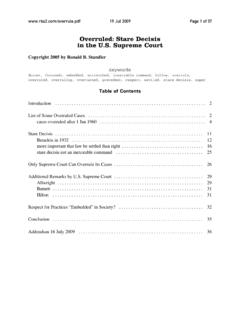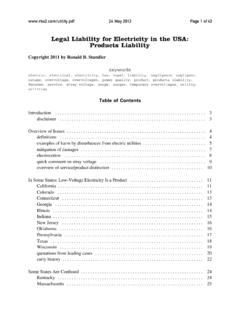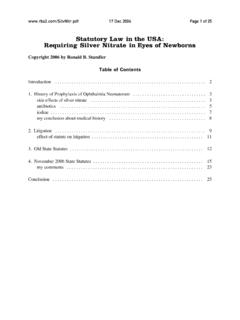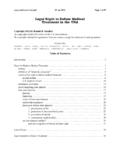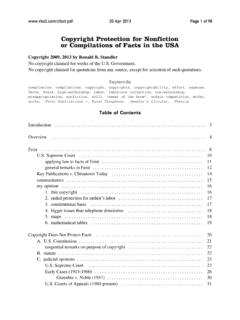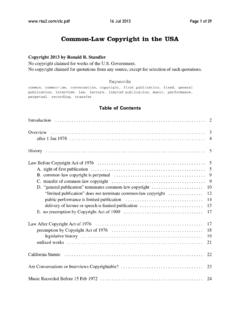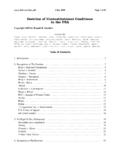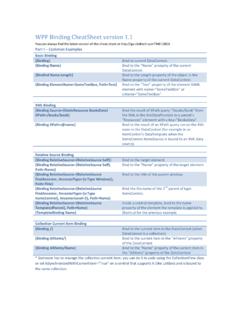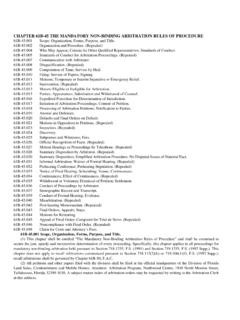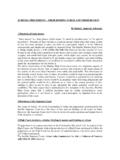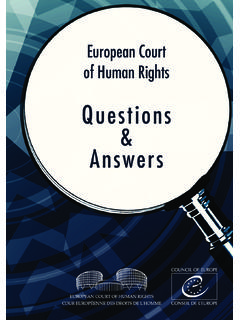Transcription of Promises by Political Candidates Not Legally …
1 Apr 2012 Page 1 of 19 Promises by Political CandidatesNot Legally Enforceable in the USAC opyright 2012 by Ronald B. StandlerNo copyright claimed for works of the copyright claimed for quotations from any source, except for selection of such , campaign, contract, contracts, court, election, enforceable, law,legal, legislator, legislators, Political , politician, politicians, president,promise, promisesTable of Contents1. Introduction .. 22. Overview of Reasons .. 3A. contract law .. 3B. freedom of speech .. 4C. separation of powers & Political question doctrine .. 6D. immunity .. 8executives .. 8legislators .. 9E. history .. 10F. practical considerations .. 103. Cases on Point .. Supreme Court .. 11 Lower Federal Courts .. 13 State Courts .. 14 Conclusion .. 18 Bibliography .. Apr 2012 Page 2 of 19 1. IntroductionThe fundamental structure of the democracy government in the USA is that the highest-levelgovernment executives ( , president of USA, governors of states, mayors) and all of themembers of the legislatures are elected by the citizens.
2 So how do citizens decide which candidatefor whom to vote? Most voters probably listen to campaign speeches and advertisements, thenvote for the candidate who Promises to accomplish what the voter prefers. This essay explainswhy Promises made in such campaign speeches and advertisements are not Legally enforceablepromises. This topic is important, because it is an opportunity to understand how law and politicsinteract in the USA, and a way of understanding not only civics, but also some points inconstitutional scope of this essay is limited to Promises by Candidates for either executive ( ,president, governor, mayor, etc.) or legislative branches of government, but not Candidates for thejudiciary. Some states ( , Florida and Texas) allow voters to elect judges. Candidates forjudicial positions have the critically important criterion that a judge must be impartial, whichseverely limits a judicial candidate s ability to speak on substantive issues.
3 I would solve theproblem of false Promises by Candidates for the judiciary simply by making the judiciaryappointed by the executive, with consent of the legislature. There have been several recent courtcases on this This essay is intended only to present general information about an interesting topic in law andis not legal advice for your specific problem. See my disclaimer at . Finally, in this essay I use the masculine pronoun to refer to people of both genders, becauseI am tired of writing Republican Party of Minnesota v. White, 536 765 (2002), after remand, 416 738(8thCir. 2005). See also: Buckley v. Illinois Judicial Inquiry Board, 997 224, 228 (7thCir. 1993)(Posner, J.) ( Judges remain different from legislators and executive officials, even when all areelected, in ways that bear on the strength of the state's interest in restricting their freedom of speech. ); Pennsylvania Family Institute, Inc. v. Black, 489 156 (3dCir.)
4 2007) (Pages 163-164 cite four lawreview articles on White.); Kansas Judicial Review v. Stout, 562 1240 (10thCir. 2009); Carey , 614 189 (6thCir. 2010); Bauer v. Shepard, 620 704 (7thCir. 2010).There are many articles, including: Randall T. Sheppard, Campaign Speech: Restraint andLiberty in Judicial Ethics, 9 GEORGETOWN J. LEGAL ETHICS 1059 (Summer 1996); Michael , Pay No Attention to That Man Behind the Robe: Judicial Elections, the First Amendment,and Judges as Politicians, 21 YALE LAW & POLICY REVIEW 301 (Spring 2003). Apr 2012 Page 3 of 19 2. Overview of ReasonsThere are several reasons why courts refuse to enforce Promises made by Political Candidates . First, we examine a possible basis in contract law. Then we look at other types of reasons. A. contract lawCan a politician make a Legally enforceable contract with one voter, a class of voters, or theentire constituency? The answer seems to be no, for several subject matter is not proper for a Legally enforceable contract.
5 In common contracts, oneperson2 agrees to surrender some personal legal right ( , ownership of a thing, his time, hismoney, or a legal right to do or not do something) that belongs to him personally inexchange for good and valuable consideration .3 The ability of an elected politician to docertain governmental acts is not his personal right, but a power conferred on him by virtue ofhis elected office. vote is not good and valuable consideration that will support a Legally binding contract. Indeed, it is illegal ( , bribery or violation of state s Corrupt Practices Act) to offersomething valuable in exchange for a vote. It is well settled contract law that an unlawfulpromise or illegal bargain voids a contract. See RESTATEMENT FIRST CONTRACTS 512(1932) (comment c: A promise to vote for a particular candidate in exchange for money isan illegal promise.) See also RESTATEMENT FIRST CONTRACTS 567. can not be proved that an individual person voted for a particular candidate , because ballotsare anonymous.
6 This is an addition reason why a vote is not consideration that will support alegally binding promise. that a Political candidate who makes a promise is one party to a contract, who is theother party? All of the people in his constituency or only those people who relied on thepromise in voting for that candidate ? The contact fails for lack of a definite second In this context, a corporation is a fictitious person recognized by a state as capable of suing andbeing Good and valuable consideration is a historic legal phrase. In most cases such considerationis either (1) a thing of value ( , an automobile, a computer, a house, a cow, etc.), (2) a valuableservice ( , services of a professional person, transportation, communications, etc.), or (3) Schaefer v. Williams, 15 1243, 1246, 19 212, 214 ( 4 ). Apr 2012 Page 4 of 19 politician when campaigning for election typically makes a promise in a speech, not awritten document.
7 If a politician Promises to do something during his term of office, which istypically two-years to six-years, then the promise fails to be an enforceable contract, becauseof the statute of frauds. RESTATEMENT SECOND CONTRACTS 110, 130. explained below in this essay there are various reasons ( , Political question doctrine,immunity for official acts) why a court would refuse to enforce the contract. The refusal of acourt to enforce the contract means that the promise(s) by a politicians was/were not acontract. RESTATEMENT SECOND CONTRACTS 1. B. freedom of speechThe First Amendment to the Constitution guarantees freedom of speech. Statements bypolitical Candidates are considered to be Political speech by the Supreme Court, whichgives such speech the highest level of protection under the First Amendment. Mills v. Alabama, 384 214, 218 (1966) ( Whatever differences may exist aboutinterpretations of the First Amendment, there is practically universal agreement that a majorpurpose of that Amendment was to protect the free discussion of governmental affairs.)
8 ; Monitor Patriot Co. v. Roy, 401 265, 272 (1971) ( And if it be conceded that the FirstAmendment was fashioned to assure the unfettered interchange of ideas for the bringingabout of Political and social changes desired by the people, Roth v. United States, 354 , 484, 77 1304, 1308, 1 1498, then it can hardly be doubted that theconstitutional guarantee has its fullest and most urgent application precisely to the conduct ofcampaigns for Political office. ); Buckley v. Valeo, 424 1, 14 (1976) ( Discussion of public issues and debate on thequalifications of Candidates are integral to the operation of the system of governmentestablished by our Constitution. The First Amendment affords the broadest protection to suchpolitical expression in order to assure (the) unfettered interchange of ideas for the bringingabout of Political and social changes desired by the people. Roth v. United States, 354 , 484, 77 1304, 1308, 1 1498 (1957).)
9 "); N. A. A. C. P. v. Claiborne Hardware Co., 458 886, 913 (1982) ( This Court hasrecognized that expression on public issues has always rested on the highest rung of thehierarchy of First Amendment values. Carey v. Brown, 447 455, 467, 100 2286,2293, 65 263 [(1980)]. ); Connick v. Myers, 461 138, 143-146 (1983) (discussing history of Political expressionby government employees); Apr 2012 Page 5 of 19 FCC v. League of Women Voters of California, 468 364, 375-376 (1984) ( theexpression of editorial opinion on matters of public importance, .. is entitled to the mostexacting degree of First Amendment protection. [citing four cases] ); Dun & Bradstreet, Inc. v. Greenmoss Builders, Inc., 472 749, 759 (1985) (QuotingConnick v. Myers, 461 138, 145 (1983): Accordingly, the Court has frequentlyreaffirmed that speech on public issues occupies the highest rung of the hierarchy of FirstAmendment values, and is entitled to special protection.
10 NAACP v. Claiborne HardwareCo., 458 886, 913 (1982); Carey v. Brown, 447 455, 467 (1980). ); v. City of St. Paul, Minn., 505 377, 422 (1992) (Stevens, J., concurring injudgment) ( Our First Amendment decisions have created a rough hierarchy in theconstitutional protection of speech. Core Political speech occupies the highest, most protectedposition; commercial speech and nonobscene, sexually explicit speech are regarded as a sortof second-class expression; obscenity and fighting words receive the least protection of all. ). McIntyre v. Ohio Elections Commission, 514 334, 346 (1995) ( Indeed, as we haveexplained on many prior occasions, the category of speech regulated by the Ohio statuteoccupies the core of the protection afforded by the First Amendment: [Quoting Buckley , 424 1, 14-15 (1976) (per curiam).] ); Snyder v. Phelps, 131 1207, 1215 (2011) (Quoting Connick v. Myers, 461 138,145 (1983): .. speech on public issues occupies the highest rung of the hierarchy of FirstAmendment values, and is entitled to special protection.
